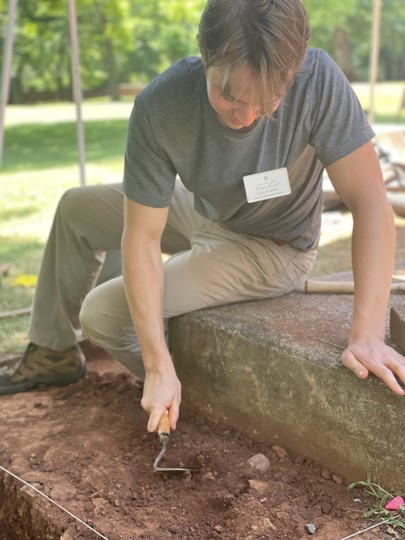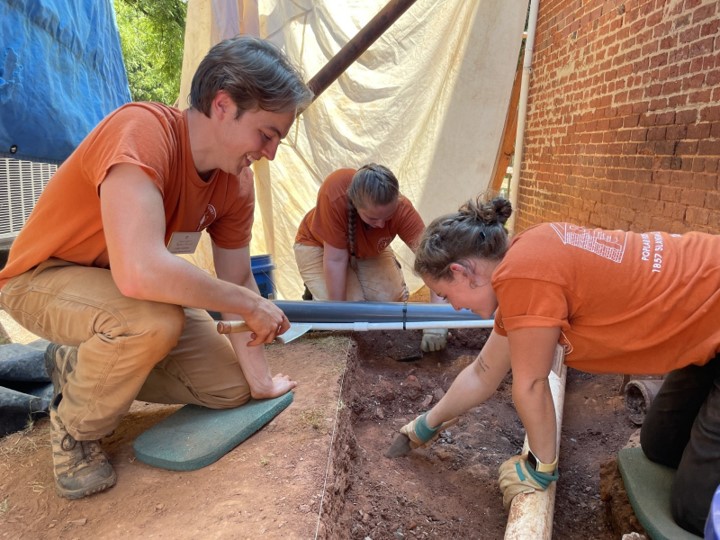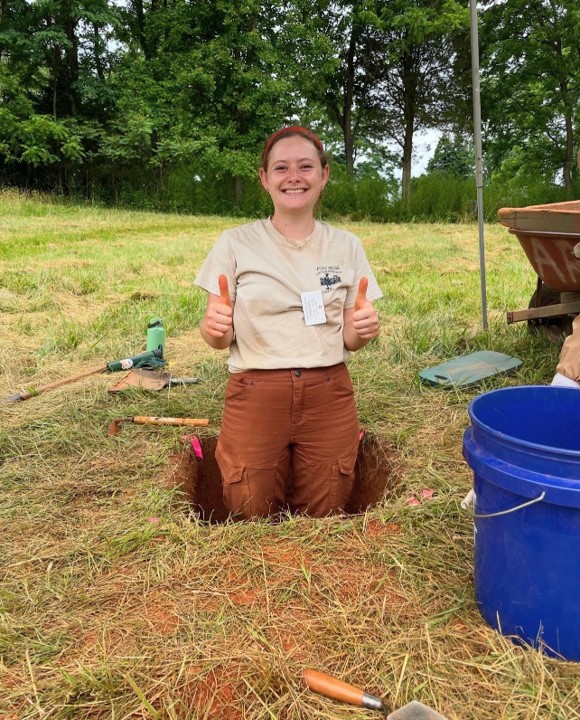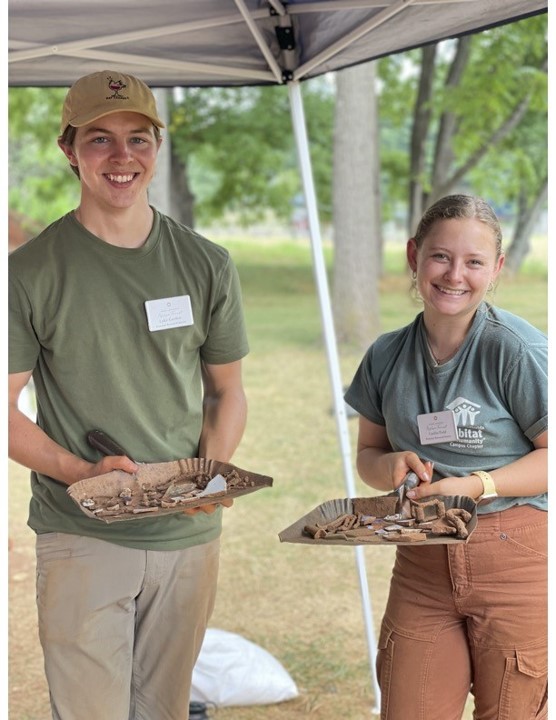Archaeology Blog
An Archaeology of Garden and Field: Two Intern Reflections from this Past Summer
Earlier this summer, Poplar Forest’s Department of Archaeology and Landscapes had the pleasure of hosting two interns as part of our Summer Research Internship in Historical Archaeology, Luke Garden and Caitlin Field. We recently asked Luke and Caitlin to reflect on the experience gained, insights made, and memories created over the eight-week program.
By: Luke Garden
Over the past two months, I had the opportunity to work alongside Caitlin as a Summer Research Intern for Poplar Forest’s Department of Archaeology and Landscapes. I am an undergraduate anthropology student at Clemson University, and although I have experience working at a smaller site in Clemson, I had never been involved with a project as extensive and complex as Poplar Forest’s 1857 Slave Dwelling Restoration Project. I learned about new artifacts that I had never worked with before, and I had the chance to use equipment and methods that were new to me. This summer was my first time working in an established laboratory, and I enjoyed learning new lab skills, such as how to take float samples and how to safely label artifacts.
The history and interpretation of the 1857 Slave Dwelling was also fascinating to me. Before coming to Poplar Forest, I was interested in the challenge of representing differing historical narratives through archaeology. Seeing how the and restoration efforts here explore Thomas Jefferson’s legacy while honoring and sharing the stories of the enslaved communities on the plantation was a powerful experience. Additionally, before this summer, I had very little experience with discussing archaeology directly with the general public, and I was grateful for the opportunity to speak with visitors about the purpose and goals of our project. Seeing firsthand how archaeology can affect people’s relationship with the past was a strong reminder of its purpose, and something that will continue to guide me through graduate school and my future.
Finally, I am grateful to everyone that I met during this internship. Not only to the amazing staff at Poplar Forest, who taught me so much, but also to the incredible field students who worked with us all summer. I am thrilled to have been a part of such a great project, and to have worked with so many brilliant and passionate people.


By: Caitlin Field
My name is Caitlin Field, and I’m a graduate student at the University of Florida, currently pursuing my M.A. in Archaeology. This summer, I had the pleasure of working alongside Luke as a Summer Research Intern for Poplar Forest’s Archaeology Department’s 33rd annual Summer Field School in Historical Archaeology—the largest in decades at Poplar Forest! Along with 14 students and Poplar Forest staff, we continued work on the ongoing 1857 Slave Dwelling Restoration Project, an interdisciplinary project aiming to research and restore the only standing slave quarter on the property. Built in the 1850s, the building housed enslaved individuals in the years leading up to emancipation after which it continued to be utilized by African American residents well into the 20th century. As such, we encountered and learned about a wide variety of historic artifacts spanning the retreat era to the late-20th century, in addition to artifacts associated with earlier Indigenous occupations. My field experience up to this point has been entirely in Florida, so the opportunity to work here in Virginia was amazing, though the clay certainly took some getting used to!
Reflecting on my time as an intern at Poplar Forest, I can’t help but think back to my own field school experience as an undergraduate as it was during my field school at Fort Mose that I fell in love with archaeology through hands-on work in the field and the lab. Being able to help facilitate a similar experience for students participating in the Poplar Forest field school was one of the most rewarding parts of my time as an intern this summer. Likewise, the opportunity to share our day-to-day findings with visitors and, especially, working alongside the public during our Public Archaeology Days was a highly impactful part of my time working here as it’s not every day that archaeologists are able to share their findings in real-time with the public.
From our weekly lectures to our field trips to Monticello, Colonial Williamsburg, and Jamestown to time spent in both the field and in the lab, this internship was such an incredible experience—one that I know I will continue to reflect on throughout the rest of my graduate career and beyond. Over the past two months, I have learned so much from the Poplar Forest staff who were all so welcoming and supportive as well as the amazing field school students whom I had the pleasure of working alongside. I’m so grateful to have had the opportunity to work with such a great group of people as part of such an important project! I can’t wait to follow along as it progresses!

